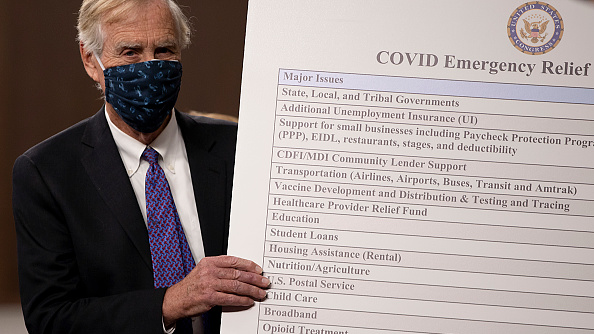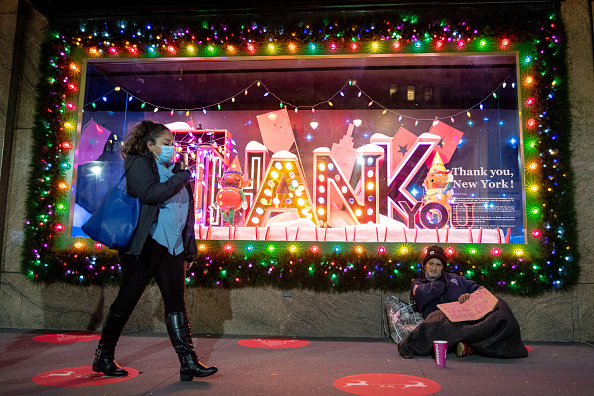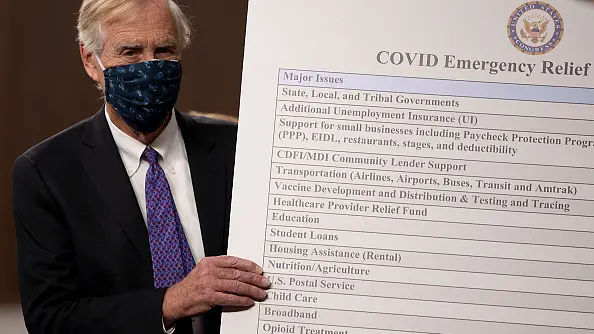
Sen. Angus King (I-ME) sets up a sign alongside a bipartisan group of Democrat and Republican members of Congress as they announce a proposal for a COVID-19 relief bill on Capitol Hill, Washington, D.C., U.S., December 1, 2020. /Getty Images
Editor's note: Stephen Ndegwa is a Nairobi-based communication expert, lecturer-scholar at the United States International University-Africa, author and international affairs columnist. The article reflects the author's opinions, and not necessarily the views of CGTN.
One of the immediate consequences of the current economic downturn caused by the COVID-19 pandemic in the U.S. has been a high rate of unemployment. Although unemployment figures in the country keep oscillating, they basically average official statistics released by the U.S. Bureau of Labor Statistics (BLS).
According to the latest and last BLS report for 2020 released on December 4, the U.S. economy gained a paltry 245,000 jobs in November as the unemployment rate fell by a meager 0.2 percentage point from October to 6.7 percent.
Worse still, the November performance was below the 440,000 jobs predicted by economists, who say that there is a shortfall of 10 million jobs to bounce back to pre-pandemic levels.
In September, the unemployment rate was 7.9 percent, totaling about 12.6 million jobless people. The BLS also reported that, in October, 15.1 million persons reported that they had been unable to work because their employer closed or lost business due to the pandemic, while about 3.6 million persons not in the labor force during the month were prevented from looking for work due to the pandemic.
Analysts fear the situation is bound to get worse if the U.S. does not curb the coronavirus pandemic which is almost getting out of control. Moreover, it is quite a tough task to claw back the high unemployment, with negotiations for a new stimulus package expected to have resumed on Tuesday in the Senate after stagnating due to the November 3 presidential elections.
A bipartisan caucus of U.S. senators has proposed a compromised $908 billion in fiscal stimulus, which includes $288 billion for small businesses and $180 billion going towards unemployment benefits. But this new deal falls short of the over $2 trillion passed by Democrats in the House of Representatives in September.
These sentiments were echoed by Biden later in the day in Wilmington, Delaware, in a press conference on the bleak jobs report by stressing that "Trump and Congress need to act now" to avert the looming catastrophe.
Economists say this package cannot wait any longer. Delays will slow down recovery and lead to the closure of small businesses, leading to massive redundancies. Moreover, thousands of jobs are not coming back, particularly because of the high casualty of small businesses.

A woman wearing a mask walks near a homeless veteran sitting in front of the newly unveiled holiday windows at Macy's Herald Square, New York City, U.S., November 21, 2020. /Getty Images
Another saving grace in helping the reopening of the U.S. economy is the expected roll-out of a vaccine in the next couple of weeks. Curiously, however, the UK has launched the exercise before the U.S., which is more devastated by the pandemic.
It is not clear what importance the vaccine is being given in the economic turnaround although, in Wilmington, Biden stressed the urgent need of fighting the coronavirus even as he worryingly said there are no detailed plans on how the vaccine would be administered.
With the coming holidays and winter, there are more fears that there will be a further spiral of infections, which will sustain the vicious cycle of lockdowns and business closures and clawback gains made in economic recovery.
Biden has put all his economic eggs in one basket, at least going by the weight he has given his newly unveiled recovery team led by Treasury Secretary nominee Janet Yellen.
Through the 74-year-old Yellen, a former Chair of the Federal Reserve from 2014 to 2018, Biden is banking on trust and experience. It is instructive that Yellen served as Fed Chair during the Barack Obama presidency when Biden was vice president.
Biden must stop America from shooting itself in the foot. He should seek a rapprochement in the incessant and malicious trade war President Donald Trump started with China, which has actually done more harm than good to America by ruining the trade synergy the two countries have enjoyed for decades.
Corporate America and the political establishment are not in tandem. Currently, several blue-chip companies and groups like Apple, Nike, Adidas and Coca-Cola, the U.S. Chamber of Commerce, are lobbying U.S. Congress to alter the Uyghur Forced Labor Prevention Act. The legislation ostensibly seeks to stop "imports of goods made with forced labor from persecuted Muslim minorities in China."
If the bill becomes law, it will bring many U.S. based multinational companies to their knees by damaging their source of raw materials. In the short to medium term, the disruption of supply chains in such a magnitude will lead to loss of revenue and jobs on a massive scale, worsening the already deteriorating situation.
Ultimately, Americans do not just want any kind of job. As the co-director of the Urban-Brookings Tax Policy Center, Eric Toder, was quoted by NBC News in an article on October 22, "while the number of jobs added is important, so is making sure that those jobs are stable, safe and pay a living wage."
(If you want to contribute and have specific expertise, please contact us at [email protected].)
 简体中文
简体中文

